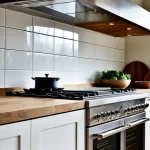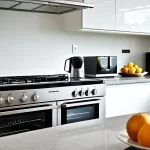Essential Strategies for Cooking Success in a Compact UK Kitchen
Maximising space efficiency is vital when applying compact kitchen cooking tips in the UK. Prioritising workflow means arranging your cooking area so that prep, cooking, and cleaning follow a natural, uninterrupted sequence—minimising unnecessary movement. Try positioning the stove, sink, and fridge in a practical triangle to optimise this flow, even in a small footprint.
Developing time-saving habits is another cornerstone. Pre-chopping vegetables or batch-cooking meals during quieter moments can dramatically streamline daily cooking routines. These habits reduce clutter and free up valuable surface area, making everyday tasks smoother.
Topic to read : Maximizing space: discover the advantages of open shelving in tight kitchen areas
Traditional cooking techniques can be adapted to UK kitchen mastery by using multi-functional appliances or techniques that save space without sacrificing quality. For instance, pressure cookers or induction hobs allow quicker meal preparation and take up less room than bulky equipment.
Overall, efficient layouts paired with clever routines help turn a compact kitchen into a well-oiled cooking machine. Mastering these strategies empowers you to maintain both functionality and enjoyment, despite space constraints.
Also to discover : Revamp your kitchen into a space-savvy sanctuary: top tips and tricks
Space-Saving Equipment and Smart Kitchen Tools
Finding the right space-saving kitchen equipment is essential for compact UK homes. Compact kitchen gadgets UK offer clever designs that maximize usability without crowding counters. For example, stackable measuring cups and collapsible colanders reduce clutter, while electric kettles with removable bases save storage space. These tools make a noticeable difference in cramped areas.
Multi-purpose cookware is a standout solution. Instead of multiple bulky pots and pans, opt for items combining functions — like a pressure cooker that doubles as a slow cooker, or a grill pan with interchangeable plates. These tools save space and cut down on the number of utensils washing up.
When considering space-saving kitchen equipment, prioritize tools that serve several functions to reduce clutter and optimize workflow. This is particularly relevant in UK kitchens, where compact layouts require smart design choices. Choosing multi-purpose cookware and compact kitchen gadgets UK boosts efficiency and keeps the kitchen organized.
Many UK retailers specialize in space-saving kitchenware. Exploring local stores and online platforms facilitates access to a wide range of innovative products. Investing in smart kitchen tools transforms confined spaces into highly functional cooking areas.
Clever Organisation and Storage Hacks
Maximising kitchen organisation UK begins with smart use of vertical space. Installing tall shelving units or wall-mounted racks can free up cupboards and counters, crucial in compact areas. Vertical storage ideas allow you to store more without clutter, keeping utensils and spices within easy reach.
To enhance storage solutions for small kitchens, consider drawer dividers to separate utensils and gadgets neatly. Under-sink areas often become dumping grounds; using stackable bins or pull-out trays helps utilise this space efficiently. Similarly, pantry organisation benefits from transparent containers and labelled shelves, allowing you to spot essentials quickly and avoid overbuying.
Effective decluttering tips focus on distinguishing between essential and non-essential items. Regularly audit your kitchen tools and ingredients: keep versatile, frequently used items accessible, and store or donate seldom-used appliances. This strategy not only frees space but streamlines cooking and cleaning tasks.
Incorporating these practical storage solutions for small kitchens will transform cramped spaces into organised havens, combining function and style without overwhelming the room. For more inventive ideas tailored to limited spaces, consult expert resources on kitchen organisation UK.
Meal Preparation and Planning for Limited Space
Maximising efficiency in meal prep UK kitchens hinges on smart use of limited space. Batch cooking is a key strategy. By preparing larger portions and freezing individual servings, you save time and reduce clutter on limited fridge and freezer shelves. When batch cooking small kitchens must cope with compact appliances, prioritising meals suitable for freezing without losing quality is crucial.
Prepping ingredients in advance also streamlines cooking on busy weekdays. Washing, chopping, and portioning vegetables or marinating proteins in reusable containers keeps everything organised and ready to go. This approach minimizes countertop mess—vital when working within a limited footprint.
Choosing the right containers boosts efficiency significantly. Stackable and airtight containers designed for efficient food storage make the most of narrow fridge and shelf space. Using clear containers helps quickly identify contents, reducing food waste.
Adopting these techniques transforms even the smallest UK kitchens into practical, enjoyable spaces for meal preparation. Space-saving methods paired with thoughtful batch cooking and ingredient prep ensure you always have nutritious meals at hand without overcrowding your kitchen environment.
Boosting Cooking Skills: Expert Advice
Mastering cooking mastery in small kitchens requires smart techniques that elevate both efficiency and flavour. Expert chefs recommend focusing on multitasking and organizing tools to make the most of limited space. For example, using versatile utensils reduces clutter while maintaining functionality, key to improving UK home cooking improvement.
When tackling classic UK dishes like shepherd’s pie or fish and chips in compact kitchens, breaking down recipes into manageable steps enhances consistency. Chefs suggest prepping ingredients beforehand and using multi-use appliances—such as slow cookers or air fryers—to save time without sacrificing taste.
Building confidence is equally crucial. Regular practice helps refine techniques, turning challenging recipes into straightforward routines. Practicing knives skills, seasoning layers, and temperature control techniques directly contribute to cooking mastery in small kitchens. Moreover, experimenting with flavours and textures encourages culinary creativity even within tight spaces.
By embracing expert chef tips and prioritizing efficient habits, home cooks in the UK can achieve remarkable progress. Small kitchens become no obstacle when skills and strategies align, supporting both cooking mastery and an enjoyable kitchen experience.
Evaluating Robot Hoover Efficiency: Precision and Recall Metrics
Understanding the efficiency of a robot hoover can be approached using concepts like precision and recall, borrowed from data science. When assessing cleaning performance, precision measures how accurately the hoover picks up dirt without collecting unnecessary debris, while recall assesses how thoroughly it covers all dirt in a target area.
For example, precision is calculated as the ratio of correctly vacuumed dirt particles (true positives) to all particles collected, including any unwanted debris (false positives). Recall, on the other hand, is the ratio of correctly vacuumed dirt to all the actual dirt present (false negatives indicating missed spots). These metrics reveal the robot’s ability to balance targeted cleaning with comprehensive coverage.
In practical terms, a robot hoover with high precision but low recall might clean only visible or easy-to-reach areas, leaving hidden dirt behind. Conversely, one with high recall but low precision might pick up everything indiscriminately, potentially wasting energy by over-cleaning clean areas.
Evaluating a robot hoover using these metrics helps buyers choose models that optimize cleaning effectiveness and efficiency, aligning with their specific needs and home environments.


